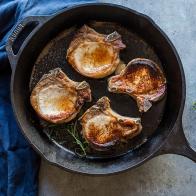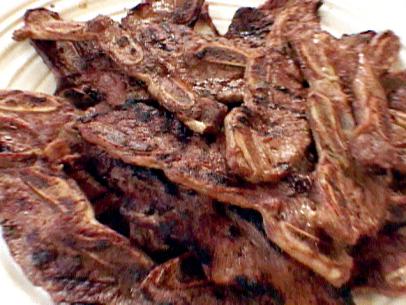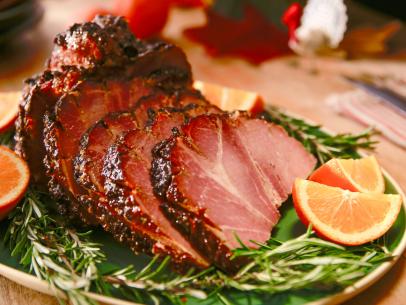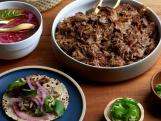
Orange-Glazed Shortribs with Kimchi Slaw
- Level: Intermediate
- Total: 1 hr 10 min (includes chilling time)
- Active: 50 min
- Yield: 6 Servings
-
- Nutritional Analysis
- Per Serving
- Serving Size
- 1 of 6 servings
- Calories
- 689
- Total Fat
- 51 g
- Saturated Fat
- 18 g
- Carbohydrates
- 33 g
- Dietary Fiber
- 3 g
- Sugar
- 21 g
- Protein
- 26 g
- Cholesterol
- 258 mg
- Sodium
- 1312 mg
- Level: Intermediate
- Total: 1 hr 10 min (includes chilling time)
- Active: 50 min
- Yield: 6 Servings
-
- Nutritional Analysis
- Per Serving
- Serving Size
- 1 of 6 servings
- Calories
- 689
- Total Fat
- 51 g
- Saturated Fat
- 18 g
- Carbohydrates
- 33 g
- Dietary Fiber
- 3 g
- Sugar
- 21 g
- Protein
- 26 g
- Cholesterol
- 258 mg
- Sodium
- 1312 mg
Ingredients
Kimchi Slaw:
Orange-Glazed Short Ribs:
Kochujang Glaze:
Directions
- For the kimchi slaw: Combine the Napa cabbage, kimchi, cilantro, sesame seeds, mint, rice vinegar and soy sauce in a bowl. Cover and refrigerate for at least 30 minutes to allow flavors to meld.
- For the orange-glazed short ribs: Lay the short ribs out on a baking sheet, drizzle with 2 tablespoons of the oil and season with the cumin, five spice, salt and pepper. Let sit at room temperature for 15 minutes.
- Combine the orange juice, ginger and garlic in a small saucepan, season with salt and pepper and cook until reduced to about 1/2 cup of glaze, about 30 minutes. Stir in the honey, strain into a bowl and let cool slightly. Discard the ginger and garlic.
- Heat a nonstick pan with the remaining 1 tablespoon of oil over medium heat until it begins to shimmer. Add the eggs and season with salt and pepper. Cook until the whites set and the yolks are slightly firm, about 2 minutes. Flip the eggs over and continue to cook for about 40 seconds longer. Transfer to a warm plate and reserve. Trim if desired.
- Heat a grill pan over high heat. Lay the ribs on the grill pan and cook until golden brown and just cooked through, about 2 minutes per side, brushing with the orange glaze several times. Trim the bones and set aside.
- For the kochujang glaze: Whisk together the kochujang, honey and vinegar. Set aside.
- To serve: Put 2 ribs in the center of each lettuce wrap, top with some kimchi slaw and an egg and drizzle with the kochujang glaze. Garnish with more toasted sesame seeds, chopped mint and cilantro, if desired.
Cook’s Note
Korean-style short ribs, also called flanken, are cut lengthwise across the rib bones into 1/2-inch-thick slices, 8 to 10 inches long. The cut can be found at most Asian markets. Kochujang is a fermented soybean and hot pepper paste that lends a sweet, spicy and salty flavor to many Korean dishes. It can be found in most Asian markets.
Looking for Something Else?
Related Pages
- Jicama Slaw Recipe
- Napa Cabbage Slaw Recipe
- Radicchio-Green Mango Slaw Recipe
- Pulled Pork Sandwich with Black Pepper Vinegar...
- Russian Dressing Slaw Recipe
- Beer Glazed Grilled Bratwurst with Wilted Red...
- Maple-Mustard-Mixed Pepper Glazed Salmon with...
- Fried Chicken, Korean Style with Napa Cabbage...
- Red Slaw Recipe

































